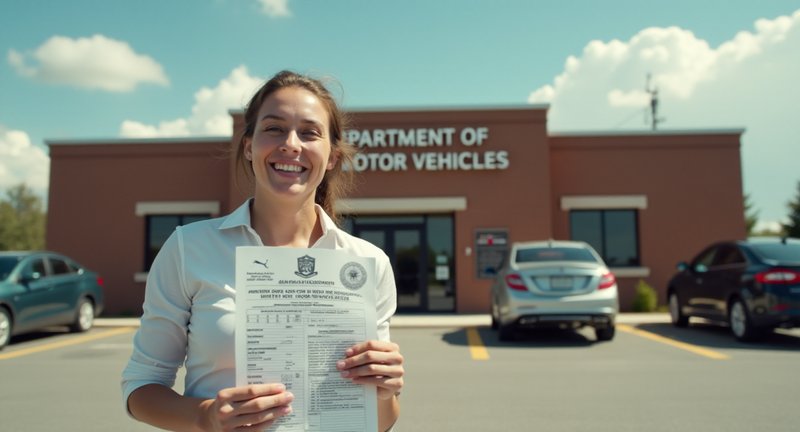The Essentials of Idaho Driving Record
When dealing with driving through Idaho’s sprawling landscapes, knowing your Idaho Driving Record isn’t just a formality, it’s essential. You might think of it as a mundane list of stats, but I see it more as a snapshot of your road reputation something that follows you like a shadow.
Every speeding ticket, license suspension, and traffic violation leaves its mark. And believe me, it’s like a travelogue, but for your driving behavior. I’ve learned the hard way that keeping an eye on it saves you from unexpected surprises like inflated insurance rates. If you’re unaware of what’s on your Idaho driver history, it’s like heading out on a road trip without checking your fuel gauge.

Some people don’t realize that this document can affect their opportunities for certain jobs, or even their insurance premiums. It’s not just a piece of paper, it’s more like a record of trustworthiness behind the wheel. I always tell folks to review their Idaho motor vehicle report annually, even if they’re not the lead foot on the highway.
If you’re anything like me, you’d want to clear up any mistakes on that record. Yes, errors happen, and contesting them is worth the effort. Think of it as tuning up your vehicle for optimal performance only this time, you’re fine-tuning your driving history.
Managing Your Idaho Driving Record
Keeping track of your driving history in Idaho can feel like navigating a winding mountain road unexpected turns can pop up if you’re not paying attention. From my own experience, the key is staying ahead of things before they pile up.
You might think, ‘I’m a good driver, do I really need to check?’ but here’s the thing: surprises lurk where you least expect them. Maybe there’s a speeding ticket you forgot about, or a mistake you didn’t even know existed. Catching those errors early can save you a headache down the line.
I remember once assuming that all was well, only to find out months later that my insurance premium had spiked because of an unresolved issue. It was a simple oversight, but a costly one. So, trust me taking a peek at your records now and then is like preventative maintenance for your car.

When you’re hitting the open road in Idaho, it’s not just about keeping your vehicle in shape it’s also about keeping your own driving history squeaky clean. Doing so helps you avoid unnecessary penalties and keeps your insurance in check. Plus, you won’t have any nasty surprises when it’s time to renew your policy or apply for something important.
So next time you’re organizing your paperwork or planning that scenic drive, take a moment to check on where you stand. It’s like doing a quick tune-up before a big road trip nothing fancy, but it gives you peace of mind.
Understanding Driving Records in Idaho
When you get behind the wheel in Idaho, there’s more than just scenery to consider. A driver’s history here plays a pivotal role in many aspects of life, more than you might think at first glance. Insurance companies, employers, even rental agencies often peek into it.
One detail I’ve come to realize is that your driving history isn’t just about avoiding tickets. It can determine whether your car insurance skyrockets or stays at a decent level. Even a minor infraction, something that felt like a blip in your day, can linger far longer than you’d expect.
Imagine applying for a job and realizing your past speeding tickets can actually sway the decision. It’s not just about staying legal on the road – it’s also about maintaining credibility. Employers, particularly in positions where you’ll drive, have a keen interest in how you’ve performed on the roads.
This document can also affect your ability to rent a vehicle on your next road trip. Rental companies sometimes refuse to rent cars to those with a troubled history on the road, making that spontaneous adventure a little more complicated.
Keeping your driving record clean is like nurturing a reputation. One small mistake can have lasting effects that echo into areas of life far removed from the daily commute. It’s an odd feeling, but in Idaho, how you drive today might influence more than your ability to get from point A to point B.
Importance of Your Driving History
Your driving history is more than just a collection of facts and dates. It tells a story one about responsibility, decisions, and sometimes a few mistakes along the way. I’ve learned that each time I get behind the wheel, I’m not just driving; I’m adding another chapter to this story.
Insurance companies, employers, and even rental car agencies love to peek into this story. Why? They want to know how reliable and trustworthy you are on the road. A few bumps along the way can have a surprising impact on your wallet. Even a minor fender bender from years ago can come back to haunt you in unexpected ways.
I remember the first time I realized how my driving history could actually affect future travel plans. Planning a road trip? Well, don’t forget that your history can determine whether you get that dream car rental or have to settle for something a little less exciting.
Keeping a clean slate on the road is like maintaining a passport to freedom. It’s a quiet, behind-the-scenes asset that opens doors or slams them shut when you least expect it. Believe me, staying mindful of how you drive today makes tomorrow’s journeys much smoother.
Who Can Request Your Driving Record?
Who exactly has the right to peek into your driving history? It’s not a free-for-all. A handful of entities are authorized to access this info, and they all have pretty solid reasons. Let’s break it down into bite-sized pieces:
- Insurance companies: They love nothing more than digging through your driving history when you’re shopping around for a new policy or renewing an old one. They check your record to assess how risky you are as a driver tickets, accidents, you name it. It can impact your rates significantly.
- Employers: Especially if you’re applying for a job where you’ll be behind the wheel. From delivery drivers to long-haul truckers, many employers want to know if you’re a safe bet. They’ll look for things like DUI charges or multiple speeding tickets.
- Government agencies: Various government bodies, such as the DMV, or even law enforcement, may need to access your driving record. Sometimes it’s just part of routine paperwork, but it can also be used in legal cases or investigations.
- Yourself: Yes, you can request your own record. It’s smart to check it now and then to make sure everything’s accurate after all, mistakes happen, and you don’t want incorrect information haunting you.
Others can access it, too, like lawyers for court cases or certain rental car companies if you’ve got a long rental history. But here’s the kicker: Not just anyone can get it on a whim. There are privacy laws in place, and most requests need a pretty good reason.
Types of Driving Records Available
Driving records can be a fascinating peek into your driving habits, right? There’s more than just one type of record out there, and depending on your needs whether it’s for a job application or just personal curiosity you’ll want to know exactly what you’re looking at.
Here’s a quick breakdown of the different kinds of driving records you might come across:
-
Basic Driver Record: This one covers the essentials. Think of it as your driving resume. It typically includes basic info like your name, address, and license status. You’ll also find any traffic violations, convictions, or accidents over a certain period.
-
Certified Driver Record: Need something more official? This version of your driving record is certified, meaning it’s been officially stamped or sealed. It’s often used for legal or employment purposes when a basic record just won’t cut it.
-
Commercial Driver Record: If you’re driving a truck or a bus, this is your go-to. It focuses specifically on commercial driving history and includes details relevant to maintaining a commercial driver’s license.
-
Lifetime Driving Record: For those who want to take a deep dive, the lifetime record lays everything bare. Every ticket, every violation it’s all there from day one. It’s not typically requested but could be useful in special cases like court proceedings.
-
Insurance Record: Insurers often pull this one. It’s mainly focused on violations and accidents that impact your insurance rates. If you’re curious about why your premiums are through the roof, this might have some answers!
Each of these records has its own purpose, and knowing which one to request can save you a lot of time and frustration.
Required Information for Record Requests
Regarding accessing certain records, you’ll need to provide a few essential pieces of information. Over the years, I’ve learned that every request starts with knowing exactly what’s required. It saves time, avoids delays, and just makes life a little easier.
First, make sure you have your personal identification at the ready. This could be anything from a driver’s license to a state-issued ID. It’s the golden ticket, so to speak, and without it, you’re not getting anywhere.
Next, jot down details such as your full name, birth date, and current address. These may seem obvious, but even small mistakes can cause major setbacks. Double-check everything before submitting.
Another key item is your driver’s license number. Trust me, if you don’t know it off the top of your head, now’s the time to look it up. It’s crucial to have this right to ensure your request is processed correctly.
Sometimes, you may also be asked to provide a specific reason for your request. In my experience, this is more of a formality, but being prepared to explain your purpose can streamline things.
Also, don’t forget about any applicable fees. Record requests often come with a small charge, so it’s worth having your payment method handy. It’s a small price for peace of mind.
Online Methods to Access Your Driving History
Accessing your driving history online can feel like a breeze once you know where to look. Over the years, I’ve found it fascinating how simple it is to retrieve important documents from the comfort of home, especially when we’re used to bureaucratic mazes.
To kick things off, most states have dedicated portals where you can quickly log in, verify your identity, and pull up your driving information. Some sites even offer downloadable reports, making it easy to save a copy for your records. However, I recommend double-checking the specifics to ensure you’re using the official government site – no one wants to end up on a shady third-party page!
What’s great about accessing your driving history online is the convenience. No more waiting in long lines at the DMV or scheduling an appointment weeks out. I love the fact that these services are often available 24/7. Even if you’re a night owl like me, you can still grab your report whenever it suits you.
Just be mindful of any fees associated with these records. Depending on where you are, you might need to pay a small amount, but it’s usually worth it for the ease and speed of getting what you need. Remember, keeping an eye on your driving history is more than just curiosity – it can be essential if you’re looking to keep your insurance rates in check or apply for specific jobs.
Requesting Your Driving Record by Mail
Let’s talk about the good old-fashioned way to get your Idaho Driving Record by mail. Yeah, it’s not the quickest route, but sometimes, slow and steady wins the race. Maybe you’re not in a rush, or perhaps you just like doing things a bit more traditionally. Whatever the reason, here’s the rundown.
First, you’ll need to fill out the request form, which you can find online. Print it out, grab a pen, and channel your inner retro self. Once that’s done, you’ll need to mail it along with the necessary fee to the Idaho Department of Transportation.
You might be wondering how long this will take. From my experience, it’s usually a couple of weeks. Patience is key, and it’s kind of a relief to take a break from instant results sometimes, isn’t it? While you wait, you can imagine your Idaho driver’s history making its way through the postal system like a small, important adventure.
Once it arrives, you’ll have that record in your hands proof of your clean driving history, or at least a chance to check for any surprises. I always say, it’s a good idea to keep track of what’s on there, especially before a big road trip.
Visiting Local DMV Offices for Records
Visiting your local DMV office for records can feel like a chore, but it’s not as bad as you might think. I’ve spent more than a few mornings at these offices, and trust me, it’s worth understanding the process to avoid unnecessary stress. The DMV can provide a variety of records that might surprise you. From registration histories to driver status updates, it’s a resource many of us overlook when we’re in need of detailed information.
First, let me set the scene for you: before heading to your local DMV, make sure you have all the required documents. The wait time can be significantly reduced if you’re fully prepared. Here’s a little checklist I like to follow:
- Government-issued ID – You’ll need this for any transaction.
- Proof of residence – If you’ve recently moved, they’ll want to confirm your new address.
- Application forms – Print them out and fill them in beforehand if possible.
Once inside, you’ll usually need to take a number and wait your turn. Depending on where you live, this could be a quick process or something that takes up the better part of your afternoon. Either way, bring a book, podcast, or some music to keep you entertained.
One tip from personal experience: don’t forget to ask if the DMV offers any online services. Many of them now allow you to request records digitally, saving you the trouble of a visit. But if you’re like me and prefer face-to-face interaction (or if the online system feels a bit confusing), visiting the office is always a reliable option.
Fees Associated with Obtaining Driving Records
Concerning grabbing your driving history, the process can feel like it’s wrapped in hidden costs. I’ve seen firsthand that fees can vary wildly depending on where you request your record. Some states practically give it away, while others make you jump through hoops.
You might think it’s just a simple document, but getting hold of it usually comes with a price tag. There are processing fees, convenience charges, and sometimes even costs for delivery. If you’re not careful, you’ll find the total creeping up quicker than expected.
In some places, they’ll offer an online option, which sounds great, but then they’ll tack on an extra fee for the digital service. I’ve had to make the tough call between saving a couple of bucks by mailing in a request or paying for the instant online access.
It’s not just about money though; there’s also the matter of time. Expedited processing can come with another fee, especially if you’re in a hurry to meet a deadline. I always tell people, be prepared, both financially and time-wise, when you need to pull these records.
The best advice I can give is to check all the fine print before requesting a copy. It’s not fun to get hit with a surprise fee after you’ve already committed to the process. A little bit of research goes a long way in avoiding unnecessary costs.
How to Correct Errors in Your Driving Record
Correcting errors in your driving record can feel like trying to untangle a stubborn ball of yarn frustrating, time-consuming, and not always straightforward. I’ve been through this process, and trust me, it’s worth the effort to ensure your driving history reflects the truth. Here’s how you can navigate these choppy waters and come out unscathed.
1. Gather Your Evidence:
Start by collecting any documents that can support your claim. This might include:
- Court documents from any tickets or violations.
- Insurance statements that prove you were covered during the alleged infractions.
- Witness statements if applicable, detailing your side of the story.
2. Contact the Appropriate Authority:
Once you have your evidence, it’s time to reach out to the right folks. Depending on where you live, this could be the department of motor vehicles or a similar agency. Be prepared to:
- Explain your issue clearly and concisely.
- Provide copies of your supporting documents.
- Request a correction politely, as tone can go a long way.
3. Follow Up:
After your initial contact, make sure to keep tabs on your request. Don’t be shy about checking in if you haven’t received a response in a reasonable timeframe. It’s easy for things to slip through the cracks.

4. Keep Records of Everything:
Document every step of the process, including dates of correspondence and names of individuals you’ve spoken to. This not only helps in keeping you organized but also serves as proof if you need to escalate your request.
Taking these steps can help ensure that your driving history is as spotless as a freshly washed car. It’s about time you took control of your record!
The Fundamentals of Idaho Driving Record
In the context of hitting the open roads of Idaho, understanding the landscape of your driving history is crucial. Your driving history is more than just a list of past infractions; it’s a reflection of your journey behind the wheel. From scenic drives along the Snake River to navigating the winding paths through the Sawtooth Wilderness, having a clean slate or a comprehensive understanding of your driving history can make all the difference.
Key Points to Consider:
-
Traffic Violations: Keep in mind that every speeding ticket or failure to signal is recorded. If you’ve had a few bumps along the way, it’s worth knowing how they can affect your future driving.
-
Accidents: Accidents can impact your insurance rates and overall record. Even minor fender benders may linger in your history longer than you’d think.
-
Suspensions and Revocations: If you’ve ever faced a suspension or revocation of your driving privileges, you’re probably aware of the hurdles in regaining them.
-
Checking Your History: I recommend checking your driving history periodically. It’s like getting a health check-up for your vehicle; knowing what’s under the hood is vital.
-
Insurance Implications: Your history can influence your insurance premiums. A clean record often leads to lower rates, while a troubled history can send your costs soaring.
Navigating Idaho’s roads is an adventure, and I’ve learned that keeping a keen eye on my driving history ensures I can enjoy all the breathtaking views without any unexpected bumps in the road.
Understanding Confidentiality and Privacy Issues
Understanding confidentiality and privacy issues is paramount in today’s travel landscape. Having navigated various travel experiences myself, I’ve come to appreciate how these issues can deeply affect our journeys.
When we think about confidentiality and privacy, several key aspects come into play:
-
Data Protection: Every time we book a flight, reserve a hotel, or rent a car, we share personal information. This includes our names, contact details, and sometimes even financial information. It’s essential to know how this data is stored and whether it is vulnerable to breaches.
-
Surveillance: Increasingly, destinations are employing surveillance systems for security purposes. While this can enhance safety, it raises concerns about how our movements are monitored. Personally, I often wonder who has access to that footage and how it is used.
-
Travel Apps: I love the convenience of travel apps, but they often require extensive personal data. Before downloading, I recommend reviewing their privacy policies to understand how your information will be used.
-
Social Media Sharing: In our age of connectivity, sharing travel experiences on social media can sometimes lead to unintended privacy violations. Be mindful of what you post and consider the potential implications.
In my experience, it’s about striking a balance between enjoying our travels and safeguarding our privacy. By staying informed and cautious, we can protect ourselves while still embracing the excitement of exploration.
Using Your Driving Record for Insurance Purposes
When I first started navigating the winding roads of car insurance, I quickly realized how vital my driving history was to the overall cost and coverage options available to me. It’s fascinating how a simple record can open or close doors to better deals and discounts. Here’s how you can leverage your driving record for insurance purposes, based on my experiences.
The Power of Your Driving History
-
Premium Influence: Your driving history significantly impacts your insurance premiums. A clean record often translates to lower rates, while infractions can lead to hikes.
-
Discount Eligibility: Many insurers offer discounts for safe driving. Maintaining a pristine driving record can lead to various savings:
- Good driver discounts
- Safe vehicle discounts
- Bundling discounts with other policies
-
Claims Process: In the unfortunate event of an accident, having a good driving record can ease the claims process. Insurers tend to trust drivers with a clean slate more than those with a history of mishaps.
-
Negotiation Power: A solid driving history can provide you with leverage when discussing your policy with insurance agents. If you’ve maintained good habits behind the wheel, don’t hesitate to ask for better terms or discounts.
-
Review Regularly: Just like a good book, your driving record needs to be revisited. I often check mine for inaccuracies or outdated information that may affect my insurance rates.
In my experience, your driving record is more than just a list of your past; it’s a narrative that tells insurers how responsible you are on the road. So, be sure to harness this information wisely.
Essential Information
How do I get my driving record from Idaho?
To obtain your driving record in Idaho, you have several options. You can request it online through the Idaho Transportation Department’s website, where you’ll need to provide personal information such as your name, date of birth, and driver’s license number. Alternatively, you can visit a local DMV office and fill out a request form in person. Another option is to request your driving record via mail, which requires downloading a form from the website, filling it out, and sending it along with the appropriate payment. Keep in mind that there may be a fee associated with obtaining your record.
What is the driver record dashboard in Idaho?
The driver record dashboard in Idaho is an online tool provided by the Idaho Transportation Department that allows drivers to access their driving records and monitor their status. This dashboard gives users a comprehensive overview of their driving history, including any traffic violations, accidents, and points accumulated. Additionally, it helps drivers stay informed about their driving privileges and any necessary actions, such as renewing their license or attending traffic school. The dashboard is user-friendly and provides a secure way to manage and review driving-related information.
How long does a DUI stay on your driving record in Idaho?
In Idaho, a DUI conviction remains on your driving record for ten years. This period begins from the date of the offense. However, it’s important to note that while the DUI may affect your insurance rates and driving privileges for this duration, it does not necessarily mean that you cannot apply for driving record expungement after a certain period. Idaho law outlines specific eligibility criteria for record expungement, which can help mitigate the long-term impact of a DUI on your driving history.
What is the DD number on an Idaho driver’s license?
The DD number, or Document Discriminator number, is a unique identifier located on the front of an Idaho driver’s license. It helps differentiate between various issued documents, ensuring that each driver’s record can be accurately tracked within the state’s database. The DD number is essential for administrative purposes, such as verifying identity and processing driver record requests. It is distinct from the driver’s license number, which is primarily used for identification and verification when you interact with law enforcement or other state agencies.
How do I check my record in Idaho?
To check your driving record in Idaho, you can access the Idaho Transportation Department’s website and use the online portal designed for this purpose. By entering your personal information, such as your name and driver’s license number, you can view your current driving status and history. Additionally, you can visit a local DMV office in person to request a copy of your record. This may involve completing a form and paying a small fee. Checking your record regularly helps you stay informed about your driving history and any potential issues.
Is Idaho a public record state?
Yes, Idaho is considered a public record state, meaning that many types of government records are accessible to the public. This includes driving records, court documents, property records, and other official records maintained by state agencies. However, certain sensitive information may be exempt from public disclosure for privacy reasons. To access public records in Idaho, individuals can make requests to the appropriate government agency, either online, in person, or via mail. Fees may apply, depending on the type of record and the method of access.
What is the best driving record?
The best driving record is one that reflects safe driving behavior, typically characterized by no traffic violations, accidents, or points on the driver’s license. A clean driving record indicates that a driver adheres to traffic laws, which can lead to benefits such as lower insurance premiums, eligibility for certain driving privileges, and a positive impression on potential employers. Maintaining a good driving record involves practicing safe driving habits, such as obeying speed limits, avoiding distractions, and being aware of road conditions, which collectively contribute to safer roads for everyone.
What is driver dashboard?
A driver dashboard is an online platform that provides drivers with access to their personal driving information, similar to a driver record dashboard. It typically includes details such as driving history, license status, and any violations or points on the record. Some dashboards may also offer additional features, like reminders for license renewals, tracking of traffic school completions, and notifications of upcoming court dates. This tool is invaluable for drivers who want to stay informed about their driving status and manage their records efficiently.
What is the driving app that records hours?
The driving app that records hours is often referred to as an Electronic Logging Device (ELD). These apps are designed for commercial drivers to track their driving hours, ensuring compliance with federal regulations governing the maximum driving time. ELDs automatically record driving time, providing detailed logs of hours worked, rest periods, and vehicle usage. Some popular ELD apps include KeepTruckin, BigRoad, and Omnicomm. They help drivers maintain accurate records, making it easier to report hours of service and improve overall safety on the roads.
How do I request records in Idaho?
To request records in Idaho, you can contact the relevant government agency that holds the records you need. For driving records, this would be the Idaho Transportation Department. You can make a request online through their website by filling out a designated form and providing necessary personal information. Alternatively, you can visit a local DMV office in person or send a written request via mail. Be prepared to pay any applicable fees, and allow sufficient time for the request to be processed, especially if it involves mail delivery.











Wow, I love how you highlighted the ease of accessing driving history online! It truly is a game changer. I used to dread the long lines at the DMV, but now I can sit in my PJs, drink coffee, and pull up my records in minutes. Your advice on checking the official sites is super important, though. I once clicked on a third-party site that looked official but turned out to be a total scam! I had to cancel my card, and it was a nightmare. The 24/7 availability is a lifesaver, especially for night owls like us who prefer to handle things when the world is quiet. I always keep an eye on my driving history; it’s amazing how much you can learn about your habits and insurance. Thanks for sharing this useful info!
I completely agree! Having everything organized before making a request can save so much time and frustration. I’ve made the mistake of not double-checking my info before, and let me tell you, it just adds unnecessary stress to the process. Preparation is definitely key!
Wow, I had no idea there were so many different types of driving records! This breakdown is super helpful. I often think about how my driving habits reflect my personality, and it’s interesting to see how different records cater to different needs. I’m especially intrigued by the lifetime driving record. Can you imagine looking back at every single ticket and violation? It would definitely put things in perspective! And as someone who’s recently applied for a job that involves driving, I found the section on certified records particularly insightful. Knowing that employers take this stuff seriously makes me want to be even more cautious behind the wheel. Plus, I loved your point about how checking your own record can prevent surprises down the line definitely a good tip for all of us! Thanks for sharing this engaging content!
I always thought my driving record was pretty boring until I read this! It’s eye-opening to see how many different parties can access this info. I guess keeping it clean really is important for more than just avoiding fines!
I love how you framed driving history as a narrative. It’s so true! Every time I get behind the wheel, I think about how my past decisions shape my current experiences on the road. It’s like being an author of my own driving saga! When I went to rent a car for a road trip last summer, I didn’t realize how much my previous fender bender would influence my options. I ended up with a compact instead of my dream SUV, which taught me the importance of maintaining a clean record. Staying mindful of driving today really does pay off tomorrow especially when you’re planning that next adventure! Your point about driving history being a “passport to freedom” really resonated with me. I never thought of it that way, but it’s so true! Keeping a clean slate isn’t just about avoiding tickets; it’s about unlocking new experiences and opportunities on the road. I appreciate your insights on this topic!
I love how you’ve described the nuances of maintaining a clean driving history! It’s something many of us overlook until it bites us. A few years back, I experienced a similar situation where a minor speeding ticket from years ago came back to haunt me during a job application. I had no idea it could impact my chances! It’s funny how a fleeting moment can stick around longer than we think. I’ve learned that checking my record regularly not only keeps my insurance rates manageable but also helps me stay prepared for any new opportunities that come my way. And you’re right keeping that record squeaky clean can feel like nurturing a personal brand. It’s almost like an unexpected form of adulting! Thanks for sharing these invaluable tips; I feel more motivated than ever to keep my driving record in check!
You’ve hit the nail on the head! I used to think that checking my driving history was unnecessary since I’m generally a cautious driver. However, after discovering an unnoticed ticket that impacted my insurance, I quickly changed my tune! It felt like a major wake-up call. Just like maintaining your car, our driving records need attention too! I now set reminders to review mine regularly, ensuring there are no surprises when I’m renewing my insurance or applying for new jobs. Thanks for the great insights!
I completely agree with you about the importance of keeping tabs on your Idaho Driving Record! It’s wild how those little mistakes can catch up to you. I’ve had my share of surprises, and I wish I’d paid more attention earlier. It’s like you said, it’s not just a boring list; it’s a vital part of our road reputation! I always make it a point to check mine regularly now better safe than sorry, right? Here’s to smooth driving ahead!